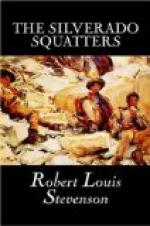THE TOLL HOUSE
The Toll House, standing alone by the wayside under nodding pines, with its streamlet and water-tank; its backwoods, toll-bar, and well trodden croquet ground; the ostler standing by the stable door, chewing a straw; a glimpse of the Chinese cook in the back parts; and Mr. Hoddy in the bar, gravely alert and serviceable, and equally anxious to lend or borrow books;—dozed all day in the dusty sunshine, more than half asleep. There were no neighbours, except the Hansons up the hill. The traffic on the road was infinitesimal; only, at rare intervals, a couple in a waggon, or a dusty farmer on a springboard, toiling over “the grade” to that metropolitan hamlet, Calistoga; and, at the fixed hours, the passage of the stages.
The nearest building was the school-house, down the road; and the school-ma’am boarded at the Toll House, walking thence in the morning to the little brown shanty, where she taught the young ones of the district, and returning thither pretty weary in the afternoon. She had chosen this outlying situation, I understood, for her health. Mr. Corwin was consumptive; so was Rufe; so was Mr. Jennings, the engineer. In short, the place was a kind of small Davos: consumptive folk consorting on a hilltop in the most unbroken idleness. Jennings never did anything that I could see, except now and then to fish, and generally to sit about in the bar and the verandah, waiting for something to happen. Corwin and Rufe did as little as possible; and if the school-ma’am, poor lady, had to work pretty hard all morning, she subsided when it was over into much the same dazed beatitude as all the rest.
Her special corner was the parlour—a very genteel room, with Bible prints, a crayon portrait of Mrs. Corwin in the height of fashion, a few years ago, another of her son (Mr. Corwin was not represented), a mirror, and a selection of dried grasses. A large book was laid religiously on the table—“From Palace to Hovel,” I believe, its name—full of the raciest experiences in England. The author had mingled freely with all classes, the nobility particularly meeting him with open arms; and I must say that traveller had ill requited his reception. His book, in short, was a capital instance of the Penny Messalina school of literature; and there arose from it, in that cool parlour, in that silent, wayside, mountain inn, a rank atmosphere of gold and blood and “Jenkins,” and the “Mysteries of London,” and sickening, inverted snobbery, fit to knock you down. The mention of this book reminds me of another and far racier picture of our island life. The latter parts of Rocambole are surely too sparingly consulted in the country which they celebrate. No man’s education can be said to be complete, nor can he pronounce the world yet emptied of enjoyment, till he has made the acquaintance of “the Reverend Patterson, director of the Evangelical Society.” To follow the evolutions of that reverend gentleman, who goes through scenes in which even Mr. Duffield would hesitate to place a bishop, is to rise to new ideas. But, alas! there was no Patterson about the Toll House. Only, alongside of “From Palace to Hovel,” a sixpenny “Ouida” figured. So literature, you see, was not unrepresented.




